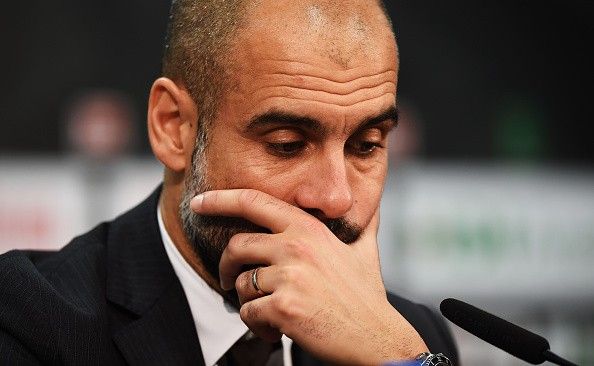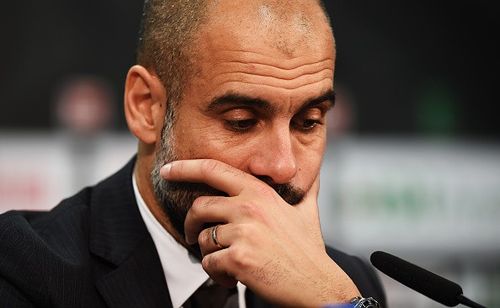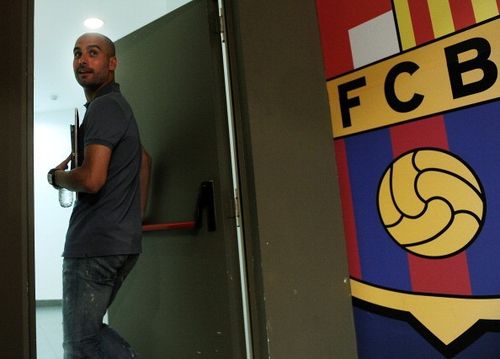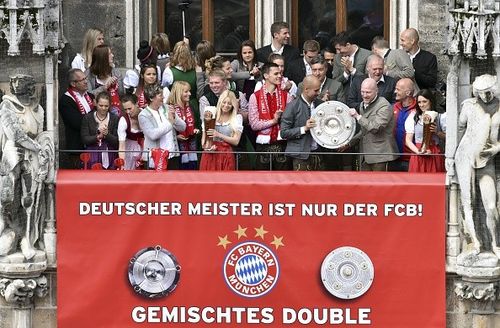
Pep Guardiola's exit from Bayern Munich in 2016 raises more questions than answers
Like a worn-out battery that needs to be replaced, the time has finally come for Bayern Munich to replace Pep Guardiola. The end is finally here, but for some Bayern Munich fans, it couldn't have come sooner. The constant speculation surrounding the Spaniard's future had made fans nervous while some just wanted it over and done with.
Despite arriving amidst plenty of fanfare, his departure is unlikely to make as much of an impact. While some of that is down to the long drawn-out soap opera surrounding his future, much of it is due to the fact that, like Jupp Heynckes before him, his decision is unlikely to significantly hinder the Bayern juggernaut.
It all seemed so swift that you almost got the feeling this wasn't something that was done overnight. Still, the announcement that Carlo Ancelotti will take over from Guardiola in the summer of 2016 ensures the Bavarian club's future is in safe hands. But the 44-year-old's departure raises more questions than answers.
Why would Guardiola leave now?
Why is a manager who has won the league twice (and is on course for a third title) even contemplating leaving? Chelsea sacking Jose Mourinho showed that things can go wrong even for the best, but why is Guardiola leaving before anything has gone wrong? If he is, as some reports suggest, leaving for Manchester City, what could they possibly offer (apart from a lot of money) that Bayern don't?
The answers for all those questions can be found in something he said three years ago when he announced that he was going to leave the then reigning European champions, Barcelona.
“I have given everything and I have nothing left.”
These were Pep Guardiola's words when he left Barcelona after winning 14 trophies in four years. Although he didn't say those exact words when Bayern Munich announced that he will be leaving at the end of the season, you got the sense he didn't need to.
Although Bayern are winning trophies domestically, they seem to hit a semi-final ceiling in the UEFA Champions League. His tactics that have helped the club win games even before kickoff in Germany don't seem to be of much use against the best teams in Europe. Against Barcelona last year and against Real Madrid the year before, they were left tactically exposed. Guardiola was found out.
While he might yet go on to win this year's Champions League, a tough draw in the round of 16 dramatically decreases their chances of progressing to the next round, let alone the final.
Picking fights when there is little need
On the outside and on the pitch, Guardiola seems like a charming genius, the kind you would love to have a chat with. But underneath that ‘nice guy’ exterior is a manager who is every bit as high-maintenance as another tactical mastermind, Jose Mourinho.
Despite all the success that he has achieved with the club and the warm welcome he received he first came in, the relationship him and the club has always been cordial at best. The club don't understand why he doesn't raise important issues with the board personally while the manager isn't used to the club's corporate culture.
Things got frosty during the club's summer tour of China when club chairman, Karl-Heinz Rummenigge, rather cheekily remarked that the show will go on even if Guardiola doesn't renew his contract. Despite the tongue-in-cheek nature of the remark, the Spaniard took offence to the statement and sulked on the way back to Germany.
Then there were the rows with the club's doctor, Hans-Wilhelm Müller-Wohlfahrt, over the frequency of injuries to Bayern's players. The sarcastic clapping and countless other instances where the 44-year-old wasn't best pleased with the man who had been with the club for almost four decades, which eventually led to Müller-Wohlfahrt's resignation. What is worse if that the 73-year-old's successor, Dr Volker Braun, has also fallen out with Guardiola over Franck Ribery's injury that will rule him out for the next eight weeks.
Some of the club's staff have even privately expressed concerned about the kind of training drills the player undergo and while everything seems rosy on the pitch, things couldn't be farther from the truth.
Leaving behind a legacy at Bayern
While there are plenty of reasons why it has come to this, that should take nothing away from his achievements on the pitch; and not just in terms of trophies. He has done everything and more to convert what was already a treble-winning team into one that is ruthlessly-motivated, supremely confident and the most tactically versatile team in the world. With every passing, records have been broken left, right and centre by a team that has immense self-confidence.
He has created a system that works and a mentality that will remain long after he is gone. David Alaba has been transformed from an ordinary left back into one of the world's finest multi-functional all-purpose footballers who is comfortable anywhere on the pitch.
Not only has he created a ruthlessly-effective winning machine on the pitch but also a close-knit team off it. Much like his Barcelona team was, minute changes have transformed a mentally fragile bunch of players into ones that have a remarkable mental advantage over their opposition.
Is he a nicer Mourinho or a trophy-winning Bielsa?
Is it a legacy that confirms he is more similar to Mourinho, arguably the last manager you would think as similar to Guardiola, or his mentor Marcelo Bielsa? Both managers are highly regarded for their tactical acumen but are notorious for their short spells at clubs because of the amount of mental and physical concentration they demand from their players and the high-intensity nature of their style of football.
While Mourinho's tactical acumen and public backing of certain players and mistrust of others isn't everyone's cup of tea, the Spaniard has shown that while he might not be as prickly as the Portuguese manager, he is every bit as intense and similar in more ways than one. What Guardiola seems to excel at, is the ability to find the right balance, which allows him to play the way he wants to play and also leave the club on his own terms.
His ability to deliver trophies consistently and short-tenure with each club have already drawn parallels with Mourinho. It is up to the Spaniard to change that perception – whether it is at Manchester City or elsewhere.


